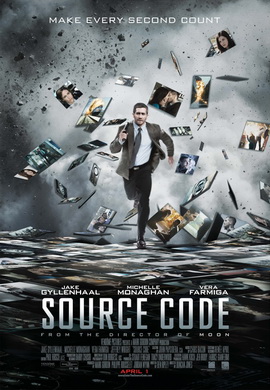
SOURCE CODE
Canada, 2011, 93 minutes, Colour.
Jake Gyllenhaal, Michelle Monaghan, Vera Farmiga, Jeffrey Wright, Michael Arden, Scott Bakula.
Directed by Duncan Jones.
Fans of intelligent thrillers will like this one.
When Captain Colter Stevens wakes on a train to Chicago and finds that his travelling companion calls him Sean and says he is a teacher, he is more than bewildered because he knows he has been serving as a helicopter pilot in Afghanistan. After some attempts at grappling with what is happening to him until there is a mighty explosion, he wakes again, this time in a special pod, discovering he is the subject of an experiment in brain control. He has been made to identify with a teacher on the train and go back into the train to discover what caused the explosion, where the bomb was situated and who triggered the device.
So, back he goes, again and again and again. Movie buffs know what the groundhog day repetition is like, everyone else the same on the same day while the protagonist retains what he has learnt from each preceding visit to the past.
While the framework of the plot is science-fiction, science-fantasy, the captain’s many attempts to find out what has gone on are like a detective story. He shows great ingenuity after a number of re-visits, especially since he has a window of eight minutes only each time. This time is based on how much the memory of a dying man retains (like an afterglow when a light has been turned off, so the inventor of this process claims). The procedure is called Source Code.
Jake Gyllenhaal does a good job of creating a puzzled man who rises to the occasion of the challenge (and experiencing the explosion a number of times). Michelle Monaghan is Christina who warms more and more each time she encounters Captain Stevens – especially as he uses his previous knowledge each time. Stevens’ contact on each return is Goodwin (Vera Farmiga), a by the book officer who is also a compassionate listener and concerned about Stevens’ mental and emotional health. The scientist behind the development of Source Code is played by Steven Wright.
Needless to say, the film builds up a serious amount of suspense, the audience wondering whether Stevens will find the bomb, identify the bomber and save the day. This involves encounters with a great number of passengers, many of them ordinary, if sometimes irritable, commuters. The action is tempered with some comic moments as well as some romantic moments.
The challenge of time travel films is the physics – and also the logic. Whatever happens at the end, there is a slight let down when you are wondering what really happened, whether it could have happened and how it could have happened. But, that’s the nature of the genre. So, it’s probably best to put relativity theory, other dimensions, parallel worlds to one side, and just get involved in the action and the psychological demands made on Stevens, his service in Afghanistan, his memories of what he did there. He also has a longing to be reconciled with his father.
The screenplay by Ben Ripley is quite ingenious. The film was directed by Duncan Jones whose first film ventured into something of the same themes though this time in a space travel situation, Moon. They say it is risky to go back to the same material for a second film, but Jones has been very successful with Source Code. (It is completely irrelevant, but many are pleased to know that Duncan Jones is the son of David Bowie.)
1. The title? Science-fiction? Mystery, time travel, psychological identification and travel?
2. The Source Code as a device, Rutledge and his invention, control, controlling Stevens? The ability to relive time, identify with other personalities, into their mind, gathering information?
3. The cast, the director?
4. The initial setting, Colter Stevens on the train, with Christina? The mirror? His identity? Identifying with the teacher? The train exploding? His trying to understand what was going on? In himself?
5. Stevens finding himself in the Cockpit, Captian Colleen Goodwin, telling him he was on mission, the search for the bomb, the threat to Chicago, in the Source Code, his moving into other lives?
6. Reliving the train sequence, going into Chicago, with Christina? The different scenarios, the different times? The reality of his being injured in Afghanistan? On life-support?
7. Finding the killer, the killer faking his own death, Christina’s death? Stevens and his getting the licence and information, communicating this? Several more attempts and different lives?
8. Stevens, the communication with his father, the relationship?
9. Christina, walking through Chicago?
10. The Source Code, Rutledge and control, Captian Goodwin and the issue of which was the real timeline?
11. The finale, Stevens in coma, the solution of the problem – and his being asked to do one more task?